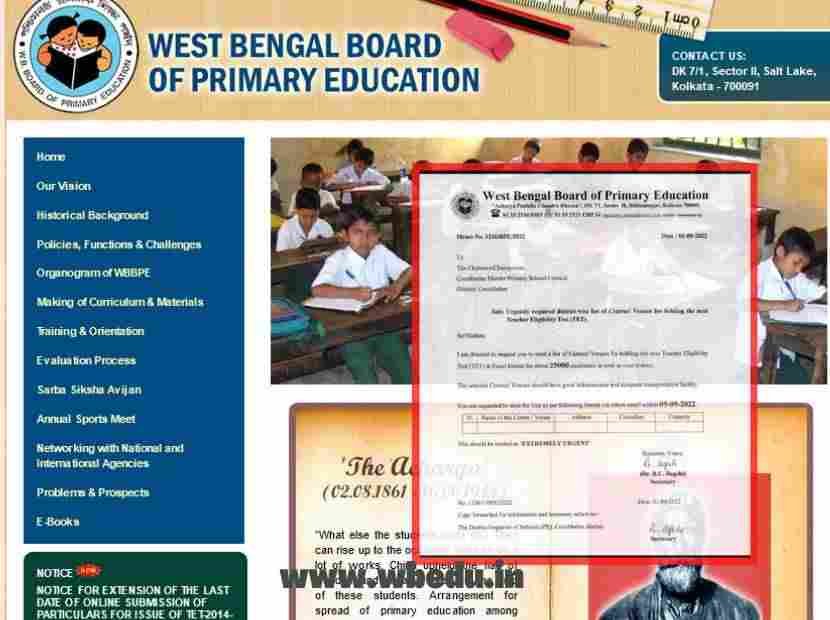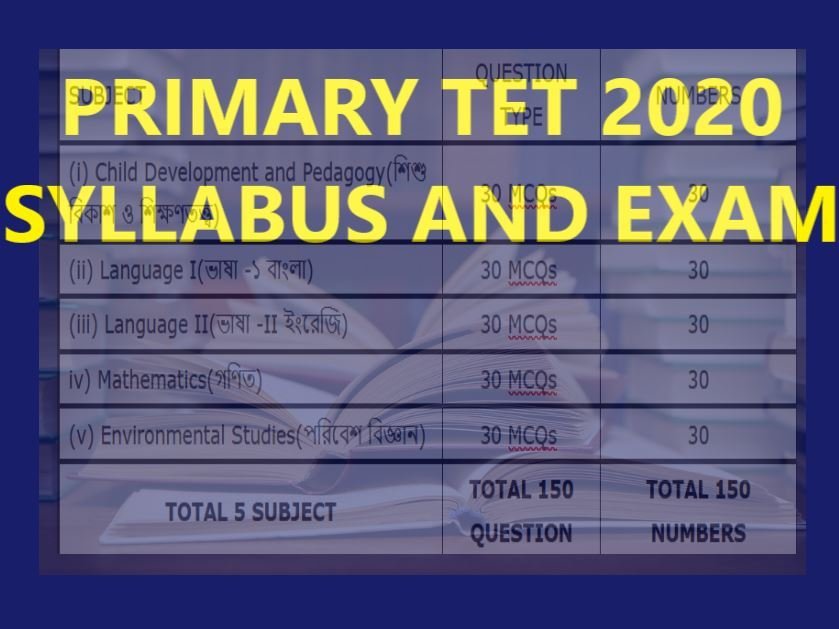This Post Contents
WB Primary tet syllabus 2022-As West Bengal board of primary Education already taken announce 3rd Primary tet exam. Now New President has announce that they going to conduct WB TET exam every year,according to supreme court verdict.
Here we discuss all latest updates about WB Primary TET syllabus 2022.This 2022 year TET exam syllabus is more about same like 2017 TET exam syllabus. Here below we discuss all updates about this.
When ever WBBPE has officially announce 2022 Primary TET exam syllabus you will find here(Click here)

WB Primary tet syllabus
| Subject | WB Primary TET Syllabus |
| Class | Primary Teacher for class 1 to 5 |
| Exam numbers | 150 |
| Duration of examination | 2.50 Hours |
| Exam time | 1 PM to 3.30 PM |
| State | West Bengal |
| Exam notification date | December 2020 |
| Exam date | 31th January 2021 |
| Vacancy | 10,000 to 15,000 {Tentative} |
| Admit card download | Click here {Live shortly} |
| Official website | WBBPE.ORG |
Primary TET exam 2021 notice out .Click here to download exam notice .

West Bengal Primary Teacher Syllabus for Paper I (class 1 to 5)
Paper I (for classes I to V); No. of MCQs – 150;
| SUBJECT | QUESTION TYPE | NUMBERS |
| (i) Child Development and Pedagogy | 30 MCQs | 30 |
| (ii) Language I | 30 MCQs | 30 |
| (iii) Language II | 30 MCQs | 30 |
| iv) Mathematics | 30 MCQs | 30 |
| (v) Environmental Studies | 30 MCQs | 30 |
I. Child Development and Pedagogy 30 Questions
A) Child Development 15 Questions
# Concept of development and its relationship with learning
# Principles of the development of children
# Influence of Heredity & Environment
# Socialization processes: Social world & children (Teacher, Parents, Peers)
# Piaget, Kohlberg and Vygotsky: constructs and critical perspectives
# Concepts of child-centered and progressive education
# Critical perspective of the construct of Intelligence
# Multi-Dimensional Intelligence
# Language & Thought
# Gender as a social construct; gender roles, gender-bias and educational practice
# Individual differences among learners, understanding differences based on diversity of language, caste, gender, community, religion etc
# Distinction between Assessment for learning and assessment of learning; School-Based Assessment, Continuous & Comprehensive Evaluation: perspective and practice
# Formulating appropriate questions for assessing readiness levels of learners; for enhancing learning and critical thinking in the classroom and for assessing learner achievement.
B) Concept of Inclusive education and understanding children with special needs(5 Questions)
# Addressing learners from diverse backgrounds including disadvantaged and deprived.
# Addressing the needs of children with learning difficulties, ‘impairment’ etc.
# Addressing the Talented, Creative, Especially abled Learners.
C) Learning and Pedagogy (10 Questions)
# How children think and learn; how and why children ‘fail’ to achieve success in school performance.
# Basic processes of teaching and learning; children’s strategies of learning; learning as a social activity; social context of learning.
# Child as a problem solver and a ‘scientific investigator’
# Alternative conceptions of learning in children, understanding children’s ‘errors’ as significant steps in the learning process.
# Cognition & Emotions.
# Motivation and learning.
# Factors contributing to learning – personal & environmental.
II. Language I. (30 Questions)
A) Language Comprehension (15 Questions)
# Reading unseen passages – two passages one prose or drama and one poem with questions on comprehension, inference, grammar and verbal ability (Prose passage may be literary, scientific, narrative or discursive).
B) Pedagogy of Language Development (15 Questions)
# Learning and acquisition.
# Principles of language Teaching.
# Role of listening and speaking; function of language and how children use it as a tool.
# Critical perspective on the role of grammar in learning a language for communicating ideas verbally and in written form.
# Challenges of teaching language in a diverse classroom; language difficulties, errors and disorders.
# Language Skills.
# Evaluating language comprehension and proficiency: speaking, listening, reading and writing.
# Teaching- learning materials: Textbook, multi-media materials, multilingual resource of the classroom.
# Remedial Teaching.
III. Language – II (30 Questions)
A) Comprehension (15 Questions)
# Two unseen prose passages (discursive or literary or narrative or scientific) with question on comprehension, grammar and verbal ability.
B) Pedagogy of Language Development (15 Questions)
# Learning and acquisition.
# Principles of language Teaching.
# Role of listening and speaking; function of language and how children use it as a tool.
# Critical perspective on the role of grammar in learning a language for communicating ideas verbally and in written form;
# Challenges of teaching language in a diverse classroom; language difficulties, errors and disorders.
# Language Skills.
# Evaluating language comprehension and proficiency: speaking, listening, reading and writing.
# Teaching – learning materials: Textbook, multi-media materials, multilingual resource of the classroom.
# Remedial Teaching.
IV. Mathematics (30 Questions)
A) Content( 15 Questions)
Geometry.
Shapes & Spatial Understanding.
Solids around Us.
Numbers.
Addition and Subtraction.
Multiplication.
Division.
Measurement.
Weight.
Time.
Volume.
Data Handling.
Patterns.
Money.
B) Pedagogical issues (15 Questions)
Nature of Mathematics/Logical thinking; understanding children’s thinking and reasoning patterns and strategies of making meaning and learning.
Place of Mathematics in Curriculum.
Language of Mathematics.
Community Mathematics.
Evaluation through formal and informal methods.
Problems of Teaching.
Error analysis and related aspects of learning and teaching.
Diagnostic and Remedial Teaching.
V. Environmental Studies (30 Questions)
A) Content (15 Questions)
Family and Friends:
Relationships.
Work and Play.
Animals.
Plants.
Food.
Shelter.
Water.
Travel.
Things We Make and Do.
B) Pedagogical Issues (15 Questions)
Concept and scope of EVS.
Significance of EVS, integrated EVS.
Environmental Studies & Environmental Education.
Learning Principles.
Scope & relation to Science & Social Science.
Approaches of presenting concepts.
Activities.
Experimentation/Practical Work.
Discussion.
CCE.
Teaching material/Aids.
Problems.
CLICK HERE FOR PRIMARY TEACHERS RECRUITMENT NEWS AND COURT CASE UPDATES
wb primary tet syllabus:- CLICK BELOW VIDEO FOR PRIMARY TEACHERS TET EXAM NUMBERS DISTRIBUTION
wb primary tet syllabus
DISCLAIMER:- SOME DATA IS COLLECTED FROM INTERNET SO THINK ACCORDINGLY.


![[WB PRIMARY TET 2014]২০১৪ সালের টেটের ভিত্তিতে প্রাথমিকে শিক্ষক নিয়োগের ক্ষেত্রে বিরাট নির্দেশ সুপ্রিম কোর্টের! Primary_Stay_Case_in_Supreme_Court](https://www.wbedu.in/wp-content/uploads/2020/02/SUPREME-COURT-OF-INDIA-218x150.jpg)

![[OFFICIAL]West Bengal board WB TET answer key 2023 PDF download,WB TET answer key 2023 PDF download Answer_Keys_TET-2023](https://www.wbedu.in/wp-content/uploads/2024/05/Answer_Keys_TET-2023-218x150.jpg)

![[wbssc 26000 job cancelled list]‘অযোগ্য’ প্রার্থী হিসাবে কতজনের নাম রয়েছে,টাকা ফেরত কতজনের,জেলা ভিত্তিক লিস্ট! wbssc_26000_job_cancelled_list](https://www.wbedu.in/wp-content/uploads/2025/04/wbssc_26000_job_cancelled_list-100x70.jpg)

![[calendar] West Bengal govt calendar 2024,West Bengal Government Holiday Calendar 2024,very big good news West_Bengal_govt_calendar_2024](https://www.wbedu.in/wp-content/uploads/2023/11/West_Bengal_govt_calendar_2024-100x70.jpg)
![[Calculator]WB Primary Teachers Recruitment Weightage Calculation,WB Primary TET Weighatge Calculator 2022,very big news WB_Primary_Teachers_Recruitment_Weightage_Calculation](https://www.wbedu.in/wp-content/uploads/2022/10/WB_Primary_Teachers_Recruitment_Weightage_Calculation-100x70.jpg)
![[Download-Print]wb primary tet admit card 2023 download,wb tet admit card 2023,wb tet admit card 2023 release date 2017_tet_exam_admit_card](https://www.wbedu.in/wp-content/uploads/2021/01/2017_tet_exam_admit_card-100x70.jpg)
